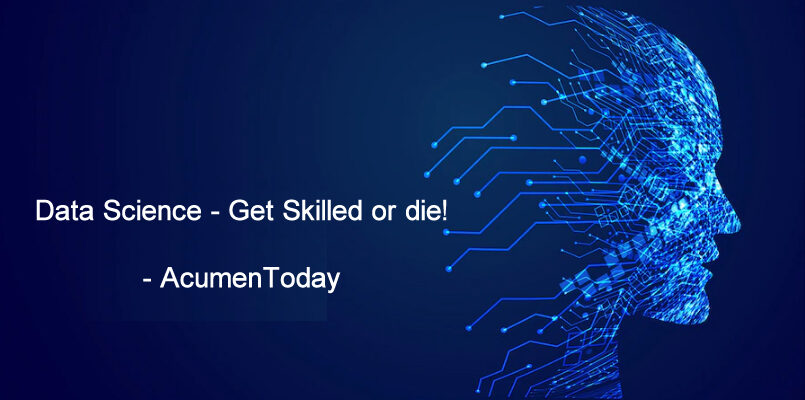
Data Science Skills & Data Science
- admin
- May 31, 2022
Data Science & Data Science Skills
Data Science – Get Skilled or you’ll be killed!
When we consider data science, we must be able to agree and concur that it’s a broad concept that cannot be defined and understood in a few sentences and none should even try to do that!
Data science begins with an eye on data and culminates in understanding the data and the numerous insights which is dependent on whether you would want to go deep into the data or go and wide (wild) with it.
The field of data science is the area which employs basic concepts, techniques, processes and algorithms to gather and analyze data from various different data sources, databases, and data structures.
In additional ways data science is also connected to data mining, data warehousing, large data (big data) and Machine learning.
In essence, data science is a very vast field that encompasses diverse subdivisions such as data extraction, data analysis, data representation, data transform, data visualization, data presentation, predictive analysis and machine learning.
Learning data science is not easy, but in the same way it’s not difficult to master either.
Learning data science and becoming a data science expert requires some fundamental skills to be acquired, learnt and developed.
We will look at the top 10 Data Science skills required to be a data scientist.
- Mathematics and Statistics Skills
- Essential Programming Skills
- Data Wrangling and Preprocessing Skills
- Data Visualization Skills
- Basic Machine Learning Skills
- Skills learned from Real World projects
- Communication Skills
- Being a Lifetime Learner
- Team Player Skills
- Ethical Skills
These are the top 10 data science skills.

We will have the details of data science skills explored one-by-one.
1. Mathematics and Statistics Skills
1.1 Statistics and Probability
Probability and Statistics are important concepts for handling data and is utilized to present or visualize information or data in a clear and effective manner so that it can be easily understood.
Some of the concepts of statistics and probability are:
- Mean
- Median
- Mode
- Standard deviation/variance
- The correlation coefficient and the covariance matrix
- Distributions of probabilities (Binomial, Poisson, Normal)
- P-value
- MSE (mean square error)
- R2 Score
- Baye’s Theorem (Precision, Recall, Positive Predictive Value, Negative Predictive Value, Confusion Matrix, ROC Curve)
- A/B Testing
- Monte Carlo Simulation
1.2 Multivariable Calculus
Multi-Variable Calculus is crucial for the development of a machine-learning model. Multi-Variable Calculus is related to the role of many variables.
The routine operations that are involved with the calculus of multivariables comprise:
- Limits and Continuity
- Partial Differentiation
- Multiple Integration
1.3 Linear Algebra
One must be aware of Linear Algebra because it is essential math skill for machine learning. Linear algebra is commonly employed in science projects as well as engineering projects.
Linear Algebra subjects require be aware of
- Vectors
- Matrices
- Transpose of the matrix
- The opposite of the matrix
- The matrix’s determinant
- Dot product
- Eigenvalues
- Eigenvectors
1.4 Optimization Methods
Optimization techniques are employed to find the most optimal solution or close to it that requires less computing.
Here are some topics that you must know about:
- A) Objective function/Cost function
- B) Likelihood function
- C) Error function
- D) Gradient Descent Algorithm and its variations (e.g., Stochastic Gradient Descent Algorithm)
2. Essential Programming Skills
Programming skills such as R or Python are crucial to data science. Additionally, the database query language, such as SQL is becoming more important.
2.1 Skills in Python
Learn the fundamental skills in Python such as Numpy, Pandas, Matplotlib, Seaborn, Scikit-learn, PyTorch.
2.2 Skills in R
Be familiar with the essential skills in R such as Tidyverse, Dplyr, Ggplot2, Caret, Stringr.
2.3 Skills in Other Programming Languages
Skills development in programming languages such as Excel, Tableau, Hadoop and Spark are equally crucial.
3. Data Wrangling and Preprocessing Skills
3.1 Data Wrangling
Data wrangling is among the most important steps for every data scientist. In a small percentage of projects data is easily accessible. The majority of the times data is stored in the database or file, or in data that is published online. The ability to understand data sorting and clean data can help make data analysis simple.
3.2 Data Preprocessing
Pre-processing of data skills are:
- a) Handling Missing data
- b) Data Imputation
- (c) Processing categorical data
- D) Class labels encoded to solve classification issues
- (e.g.) Techniques for transformative and reduction of dimensionality for example, Principal Component Analysis (PCA) and Linear Discriminant Analysis (LDA).
-
Data Visualization Skills
4.1 Data Component:
It is nothing other than knowing the kind of data. No matter whether it’s categorical data or discrete data or continuous data or time-series data and so on.
4.2 Geometric Component:
This is the art of determining which visualization is appropriate for your data. For example- scatter plot, line graphs, bar plots, histograms, Q-Q plots, smooth densities, boxplots, pair plots, heatmaps, etc.
4.3 Mapping Component:
This way one can determine what variable should be regarded as an X-variable and what is considered to be Y-variable
4.4 Scale Component:
We will decide on the scale to use, for example, the linear scale, the log scale, and so on.
4.5 Labels Component:
This is in relation to Axes labels such as titles, legends and titles font size to be used, etc.
4.6 Ethical Component:
This is when you need to be sure that the information that you provide is accurate in all respects. We need to make sure that we do not use data visualization to influence the viewers.
5. Basic Machine Learning Skills
The terms data science is a part of machine learning, as are extremely popular trendy terms nowadays. Both terms are frequently used in conjunction, but they should not be confused with similar terms. In spite of the fact that data science incorporates machine learning as well, it’s a huge field that uses a range of tools.
5.1 Supervised Learning (Continuous Variable Prediction)
- Basic regression
- Multi-regression analysis
- Regression with regularization
5.2 Supervised Learning (Discrete Variable Prediction)
- Logistic Regression Classifier
- Support Vector Machine Classifier
- K-nearest neighbor (KNN) Classifier
- Decision Tree Classifier
- Random Forest Classifier
5.3 Unsupervised Learning
- Clustering algorithm for KMeans
- K-means clustering.
- KNN (k-nearest neighbors)
- Hierarchal clustering.
- Anomaly detection.
- Neural Networks.
- Principle Component Analysis.
- Independent Component Analysis.
- Apriori algorithm
6. Skills learned from Real World Capstone Data Science Projects
A simple data science course is not enough to make you an data scientist. Skills gained from completing any academic program that focuses on data science are not enough. A certified data scientist needs to go through an actual-world, productive data science project. The project has to undergo every step associated with data science & machine learning including the framing process, data acquisition, data analysis, modeling and testing, as well as deployment. There are real-time projects available as Kaggle assignments, as well as internships as well as interviews.
7. Communication Skills
Communication skills also play a significant role when it comes to data science projects. Data scientists need to be able to communicate their ideas to their team members as well as business managers. Communication skills aid in maintaining the harmony and unity of team members like data analysts data engineers, field engineers, etc.
8. Being a Lifetime Learner
Data science is an area that is constantly evolving So be prepared to learn and master new developments. One method to keep updated on developments on the field of data science is to network to other data scientists. The three stages that are most effective in advancing the administration of systems are LinkedIn, GitHub, and Medium (Towards Data Science and toward AI Distributions). The stages are useful for current data on the latest developments within the area.
9. Team Player Skills
As an data scientist, you’ll be part of a team consisting of data investigators, engineers, and supervisors, which means you must have excellent communication skills. You must be a good audiencetoo especially in the early phases of task advancement, when you’ll need to rely on staff or engineers to to design and plan an excellent data science project. Being a competent team player can help you in succeeding in a competitive business environment and maintain great relationships with your colleagues as the heads or supervisors of your organization.
10. Ethical Skills in Data Science
Understand the implications of your decision. Be truthful to yourself. Avoid controlling data or employing a method to purposely cause an advantage in the outcomes. Be honest in every step starting with data collection and research to display building, exam as well as testing and application. Be careful not to fabricate results in order to fool or control your followers. Be ethical in the way you interpret the results of data science. data science project.